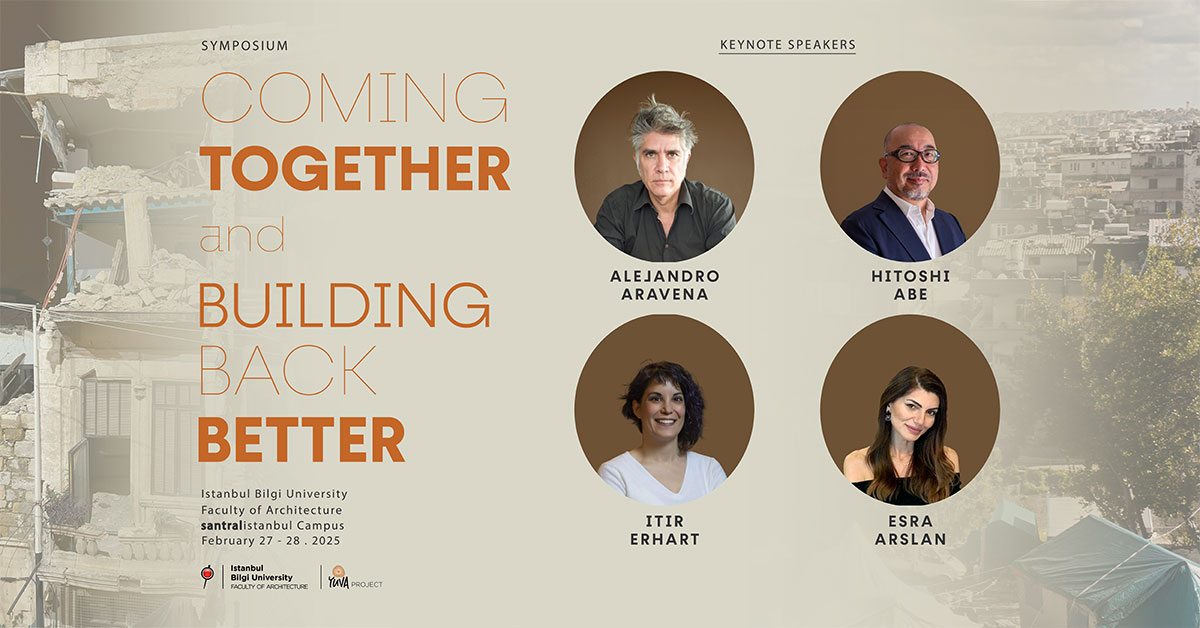Coming Together and Building Back Better

Date: February 27-28, 2025
Place: santralistanbul Campus, Seyfi Arkan Building
The devastating earthquakes of February 6, 2023, in Turkey left an indelible mark on communities, landscapes, and lives. The events caused extensive loss of life, infrastructure collapse, and significant social and economic disruption. In the wake of these events, urgent questions arise about improving resilience, reconstruction efforts, community support, and how we might better prepare for future disastrous events. One critical issue that emerges is the provision of emergency and transitional shelter to ensure safety and stability for affected populations during the prolonged rebuilding process. Emergency shelters, designed for immediate protection, serve as lifelines in the immediate aftermath of a disaster. However, transitional shelters, capable of supporting displaced communities for five to ten years, are vital for bridging the gap between crisis and permanent reconstruction. These shelters must balance practicality and dignity, offering not just physical safety but also a foundation for social, emotional, and economic recovery. In the light of this, the conference aims to create a platform for researchers, practitioners, policy-makers, and NGOs to explore the multifaceted impacts of the earthquakes and to discuss strategies for sustainable rebuilding, resilience, and risk reduction.
The conference is organized bu İstanbul Bilgi University Faculty of Architecture.
Conference Themes:
We invite both academic and non-academic submissions that address, but are not limited to, the following themes:
❖ Urban Planning for Resilience
● Urban planning strategies for earthquake-prone regions
● Constructing earthquake-resistant built environment
● Policy making and governance from the disaster response to building resilience
❖ Emergency Response and Community Preparedness
● Practices and challenges in emergency and transitional sheltering
● Coordination among manufacturers, NGOs and local agencies
● Role of community-led initiatives at community preparedness
❖ Social and Economic Impact
● Short-term and long-term socio-economic consequences
● Psychological and social support strategies for affected communities
● Educational environments in times of crisis: from the primary school to university
❖ Architecture and Local/Social Engagement
● Role of architects and designers in shelter response
● Role of community-hubs in building the community resilience
● Participatory strategies and experiences
❖ Alternative Approaches
● 1:1 scaled prototypes
● Emergency shelter
● Transitional shelter
Submission Guidelines:
We invite three types of submissions:
1. Full Research Papers (5,000–8,000 words): For in-depth research or case studies. Abstract submissions should be up to 300 words and specify the intended theme from the list above. Authors with abstract acceptance should submit their full papers by the deadline indicated below and they will undergo a peer-review process.
2. Short Presentation (300–500 words): For presentations of field reports, commentaries, company interventions, NGO proposals, etc. This category only requires abstract submission.
3. Audio-visual presentations: Filmmakers, artists, designers and so on are expected to submit an abstract with 300–500 words along with their videos up to 3 min. or visual collection up to 10 pieces. This category also targets undergraduate and graduate students’ design works regarding the disaster area.
Dates:
Call opens: December 6, 2024
Submission Deadline: January 10, 2025
Notification of Acceptance: January 31, 2025
Submission of extended papers and presentations: February 14, 2025
Programme announcement: February 21, 2025
Workshop registrations: February 17-21, 2025
Full research paper submission: April 4, 2025
Full research paper revisions: April 18, 2025
Final submission: May 2, 2025
Publication: June 30, 2025
Submission link:
https://forms.gle/fogzri1c1oVn...
Click for more information.